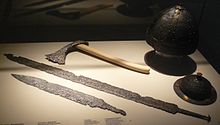
Back Franke Afrikaans Franken (Volk) ALS Francos AN Francan ANG فرنجة Arabic فرانكيين ARZ Pueblu francu AST Franklar Azerbaijani فرانکلار AZB Франкі Byelorussian

The Franks (Latin: Franci or gens Francorum; German: Franken; French: Francs) were a western European people during the Roman Empire and Middle Ages. They began as a Germanic people who lived near the Lower Rhine, on the northern continental frontier of the empire. They subsequently expanded their power and influence during the Middle Ages, until much of the population of western Europe, particularly in and near France, were commonly described as Franks, for example in the context of their joint efforts during the Crusades starting in the 11th century.[1] A key turning point in this evolution was when the Frankish Merovingian dynasty based within the collapsing Western Roman Empire first became the rulers of the whole region between the rivers Loire and Rhine. From this starting point they imposed power over many other post-Roman kingdoms both inside and outside the old empire.
Although the Frankish name does not appear until the 3rd century, at least some of the original Frankish tribes had long been known to the Romans under their own names, both as allies providing soldiers, and as enemies. The term is first used to describe the tribes working together to raid Roman territory. Frankish peoples subsequently living inside Rome's frontier on the Rhine river are often divided by historians into two groups – the Salian Franks to the west, who came south via the Rhine delta; and the Ripuarian or Rhineland Franks to the east, who eventually conquered the Roman frontier city of Cologne and took control of the left bank of the Lower Rhine in that region.
Childeric I, a Salian Frankish king, was one of several military leaders commanding Roman forces with various ethnic affiliations in the northern part of what is now France. He and his son Clovis I founded the Merovingian dynasty which succeeded in unifying most of Gaul under its rule during the 6th century following the collapse of the Western Roman Empire, as well as establishing leadership over all the Frankish kingdoms on or near the Rhine frontier. The dynasty subsequently gained control over a significant part of what is now western and southern Germany. It was by building upon the basis of this Merovingian empire that the subsequent dynasty, the Carolingians, eventually came to be seen as the new emperors of Western Europe in 800, when Charlemagne was crowned by the pope.
In 870, the Frankish realm came to be permanently divided between western and eastern kingdoms, which were the predecessors of the later Kingdom of France and Holy Roman Empire respectively. It was the inhabitants of western kingdom who eventually came to be known as "the French" (French: Les Français, German: Die Franzosen, Dutch: De Fransen, etc.) and this kingdom is the forerunner of the nation state of France. However, in various historical contexts, such as during the medieval crusades, not only the French, but also people from neighbouring regions in Western Europe, continued to be referred to collectively as Franks. The crusaders in particular had a lasting impact on the use of Frank-related names for Western Europeans in many non-European languages.[2][3][4]
- ^ "Frank | People, Definition, & Maps". Britannica. Retrieved 2023-08-12.
- ^ Angeliki Laiou; Henry P. Maguire (1992). Byzantium: A World Civilization. Dumbarton Oaks. p. 62. ISBN 978-0-88402-200-8.
- ^ Richard W. Bulliett; et al. (2011). The Earth and Its Peoples. Cengage Learning. p. 333. ISBN 978-0-495-91310-8.
- ^ Janet L. Nelson (2003). The Frankist World. Continuum International. p. xiii. ISBN 978-1-85285-105-7.